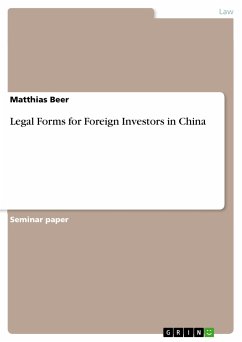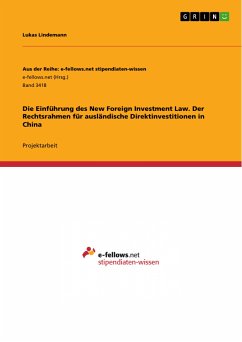Seminar paper from the year 2011 in the subject Law - Civil / Private, Trade, Anti Trust Law, Business Law, grade: 1.7, University of applied sciences, Munich, course: MBA, language: English, abstract: Executive Summary: Investing in China is still considered as one of the most profitable business opportunities. On the one hand side the Chinese market brings around 1.3 billion new potential consumers and on the other an annual growth rate of around 10%, both are quite attractive for foreign investments. Moreover, the Chinese government is permanently improving the investment climate for foreign enterprises and investors by improving respectively building the required infrastructure or revising business laws and lowering market entry barriers for foreigners for instance. Investing in China is not only a subject for large and international enterprises but also for small and mid sized private companies. China's progress in accepting market-oriented economic and business principles as well as their 2001 entry into the World Trade Organization (WTO) is attracting foreign investors the same way as a growing Chinese middle class and low labor costs. Companies of all sizes understand that by ignoring this prospering and huge market for their goods and services or by not taking ad-vantage of the latent labor arbitrage that they are risking to fall behind their competition. The assignment is providing some statistics on foreign investments in China, is dealing with a brief overview of the different industry areas for foreign compa-nies and investors in China and explains the main investment forms which can be considered for business establishment in China. The work is concluding with some general information about legal protections for foreign investors and the ITM checklist. Table of Contents: Executive Summary I List of Abbreviations III List of Figures IV List of Tables IV 1. Introduction 5 2. Foreign Investment Categories in China 7 3. Legal Forms for Foreign Investors in China 9 3.1. Joint Venture 9 3.1.1. Equity Joint Venture 10 3.1.2. Cooperative Joint Venture 10 3.2. Representative Office 10 3.3. Wholly Foreign Owned Enterprise 11 3.4. Holding Enterprises for Foreign Investors 11 3.5. "B" Stocks 12 4. Legal Protection of Foreign Investors in China 12 5. Conclusion 13 ITM Checklist 14 References 16
Dieser Download kann aus rechtlichen Gründen nur mit Rechnungsadresse in A, B, BG, CY, CZ, D, DK, EW, E, FIN, F, GR, HR, H, IRL, I, LT, L, LR, M, NL, PL, P, R, S, SLO, SK ausgeliefert werden.









